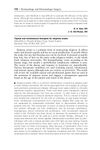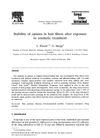 2 citations,
January 2023 in “International journal of biological sciences”
2 citations,
January 2023 in “International journal of biological sciences” Gray hair can potentially be reversed, leading to new treatments.
 2 citations,
March 2015 in “Expert opinion on orphan drugs”
2 citations,
March 2015 in “Expert opinion on orphan drugs” New treatments for hair loss show promise but need more research to confirm safety and effectiveness.
 1 citations,
October 2023 in “International journal of Ayurveda and pharma research”
1 citations,
October 2023 in “International journal of Ayurveda and pharma research” Herbal medications might be safer and more effective for hair loss than synthetic treatments.
 November 2024 in “Indian Journal of Rheumatology”
November 2024 in “Indian Journal of Rheumatology” Educating primary care doctors and improving referrals to rheumatologists can reduce delays in treating lupus patients.
 April 2024 in “JMIR infodemiology”
April 2024 in “JMIR infodemiology” TikTok videos show that people with Lupus often discuss symptoms and their significant impact on mental health, face diagnostic delays, have mixed views on treatments, and feel isolated despite support.
February 2024 in “Animals” Most dogs with adrenal-dependent hypercortisolism had normal blood pressure after one year of treatment or surgery.
 February 2024 in “Journal of ayurveda and integrated medical sciences”
February 2024 in “Journal of ayurveda and integrated medical sciences” Ayurvedic treatments helped a 16-year-old regrow hair after modern medicine failed.
 January 2024 in “International Research Journal of Ayurveda & Yoga”
January 2024 in “International Research Journal of Ayurveda & Yoga” Ayurvedic treatments can effectively regrow hair in alopecia areata.

Lupus patients on TikTok feel isolated, face medical gaslighting, and prefer non-drug treatments.
 December 2012 in “Drugs & Therapy Perspectives”
December 2012 in “Drugs & Therapy Perspectives” Doctors use their experience to choose treatments for scarring hair loss because it's hard to diagnose and treat.
 January 2012 in “The Year book of dermatology”
January 2012 in “The Year book of dermatology” Many treatments for alopecia areata have inconsistent results; for under 10s, use minoxidil with a corticosteroid, and for over 10s, add ILC and consider diphenylcyclopropenone for widespread cases.
 May 2010 in “Dermatologic Clinics”
May 2010 in “Dermatologic Clinics” The document concludes that new treatments for skin conditions are complex but effective, including spironolactone for female hair loss and propranolol for infantile hemangiomas.
 421 citations,
April 2012 in “The New England Journal of Medicine”
421 citations,
April 2012 in “The New England Journal of Medicine” Alopecia Areata is an autoimmune condition causing hair loss with no cure and treatments that often don't work well.
 164 citations,
April 2008 in “Cochrane library”
164 citations,
April 2008 in “Cochrane library” Current treatments for alopecia show no significant long-term benefits.
 151 citations,
May 2014 in “American Journal of Clinical Dermatology”
151 citations,
May 2014 in “American Journal of Clinical Dermatology” Effective treatments for male pattern baldness include oral finasteride and topical minoxidil, while topical minoxidil is best for female pattern baldness.
 149 citations,
July 2002 in “Dermatologic clinics”
149 citations,
July 2002 in “Dermatologic clinics” Patients with certain skin symptoms and high ANA titers should be monitored for potential systemic lupus.
 109 citations,
December 1998 in “The Journal of Dermatology”
109 citations,
December 1998 in “The Journal of Dermatology” Manipulating the catagen and telogen phases of hair growth could lead to treatments for hair disorders.
 101 citations,
July 2020 in “Dermatologic therapy”
101 citations,
July 2020 in “Dermatologic therapy” COVID-19 can cause skin issues like rashes and "COVID toes," and people with skin conditions should adjust their treatments if they get the virus.
 99 citations,
July 2017 in “Clinical Reviews in Allergy & Immunology”
99 citations,
July 2017 in “Clinical Reviews in Allergy & Immunology” New treatments for Alopecia Areata show promise but need to be more effective and affordable.
 99 citations,
June 2005 in “Journal of Cosmetic Dermatology”
99 citations,
June 2005 in “Journal of Cosmetic Dermatology” Hair ages due to genetics and environmental factors, leading to graying and thinning, with treatments available for some conditions.
 97 citations,
September 2016 in “Reviews in Endocrine and Metabolic Disorders”
97 citations,
September 2016 in “Reviews in Endocrine and Metabolic Disorders” The sebaceous gland has more roles than just producing sebum and contributing to acne, and new research could lead to better skin disease treatments.
 93 citations,
April 2012 in “International Journal of Cosmetic Science”
93 citations,
April 2012 in “International Journal of Cosmetic Science” Improving skin barrier and using antifungal treatments can help manage dandruff.
90 citations,
April 2013 in “Dermatology online journal” Different treatments for Hidradenitis suppurativa range from antibiotics and hormonal therapies to surgery, depending on severity.
 84 citations,
April 2005 in “Dermatologic Clinics”
84 citations,
April 2005 in “Dermatologic Clinics” Treatments for melanin disorders exist, but more effective options needed.

research Acne
81 citations,
January 2002 in “American journal of clinical dermatology” Hormonal treatments can help with acne, especially in women, by lowering androgen levels or blocking their effects.
 78 citations,
April 1994 in “Archives of dermatology”
78 citations,
April 1994 in “Archives of dermatology” The study found that Keratosis Pilaris Atrophicans is a genetic skin condition that starts in childhood, involves inflammation and scarring, and current treatments are only somewhat effective.
 77 citations,
June 2017 in “Advances in Therapy”
77 citations,
June 2017 in “Advances in Therapy” New treatments for Alopecia Areata, like JAK inhibitors, show promise for hair regrowth and are likely to change future treatment approaches.
 77 citations,
May 2012 in “Expert Opinion on Emerging Drugs”
77 citations,
May 2012 in “Expert Opinion on Emerging Drugs” New treatments for male hypogonadism are effective and should be personalized.
 63 citations,
August 1996 in “Forensic Science International”
63 citations,
August 1996 in “Forensic Science International” Cosmetic treatments like bleaching and perming can greatly reduce opiate levels in hair, possibly leading to false-negative drug tests.
 58 citations,
October 2001 in “Dermatologic Clinics”
58 citations,
October 2001 in “Dermatologic Clinics” Hair loss can indicate underlying systemic diseases and addressing these can sometimes reverse the hair loss.




























